PrivateVPN
PrivateVPN is a Swedish VPN service which may look basic in some areas, but has some surprising and unusual features.
The network is relatively small, with 63 countries and 'over 200 servers' (providers like ExpressVPN and NordVPN have thousands).
But torrents are supported everywhere, and you get easy-to-use clients for Windows, Mac, iOS and Android, as well as setup instructions for routers, Linux and more.
The company doesn't support WireGuard in its apps right now (although you can download configuration files to set it up manually). But there's plenty to like elsewhere, including OpenVPN, L2TP and IKEv2 support, a stealth mode to bypass VPN blocking, port forwarding support, system-wide and application kill switches, DNS and IPv6 leak protection and the ability to connect up to 10 devices simultaneously.
The website claims support for unblocking a host of services, including Netflix, BBC iPlayer, Amazon Prime Video, Disney Plus, Fox, NBC, CBS and more.
- Want to try PrivateVPN? Check out the website here
PrivateVPN states that it doesn't outsource support, and when you have problems, you talk directly to the developers.
You doubtless don't take every VPN's website at face value, and neither do we. But PrivateVPN has a surprisingly good reason why you should pay attention. A 4.9 rating at Trustpilot makes it 'the world's most-trusted VPN provider', the company says. That's not a 100% guarantee of good service, but it's a strong indication that PrivateVPN delivers on its promises.
Still not convinced? Just try it. PrivateVPN has a simple free plan which gives you 10GB of data a month, and a choice of 12 locations. There's no streaming support, but speeds aren't throttled, you can use P2P, and it's easy to explore the service and see how it works for you.
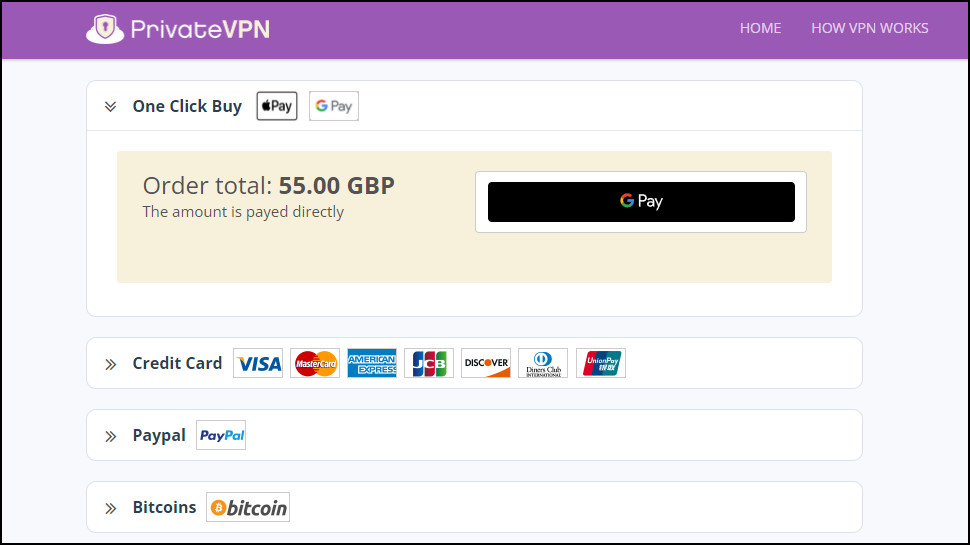
Plans and pricing
Prices are better than most at $8.99 billed monthly, or an equivalent $6 if you pay three months upfront. Opting for the annual plan gets you an extra two years for free, an effective $2 a month, although it then renews annually at an above-average $6 a month.
Payment is accepted by Google Pay, Apple Pay, card, PayPal and Bitcoin.
As we write, the PrivateVPN website claims you can get a free 7-day trial. The Start Trial link actually points to a separate purchase page with different prices. The monthly plan here is more expensive, at $10, but it also gives you 3 months for free when you sign up. That's not quite what we call a trial, but it's four months protection for only $10, which works for us.
If you're won over already, the annual plan on this page also gives you two bonus years for the first term, and it's fractionally cheaper at $1.67 a month.
Whatever option you prefer, you're protected by a 30-day money-back guarantee. Beware, though: this only applies to new customers, and you must give a reason why you're asking for the refund.
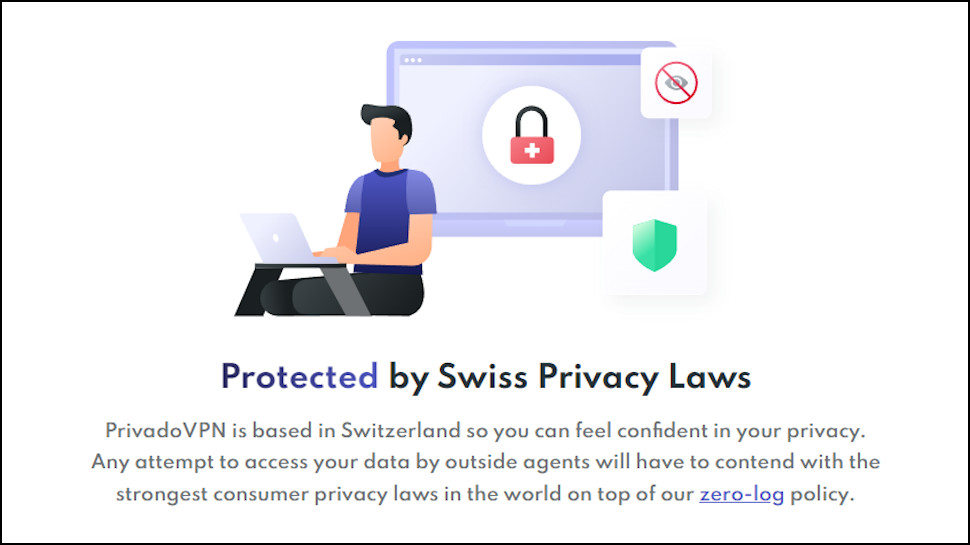
Privacy and logging
Does PrivateVPN keep any logs? The privacy policy is emphatic: "We do not collect or store logs of your activity, including no logging of browsing history, traffic destination, connection time stamps, DNS queries, IP addresses (neither allocated IP nor connected IP), data content or bandwidth."
The rest of the privacy-related small print is much like most other VPNs. PrivateVPN only holds your email address, it uses cookies on the website and might use third-party analytics, but there's no sign of data sharing or other dubious activities.
While that's good news, it still leaves potential customers having to trust that PrivateVPN is living up to its promises. Many providers are now putting their systems through public security and privacy audits, giving users real independent evidence about what they're doing, and we hope more VPNs will do the same.
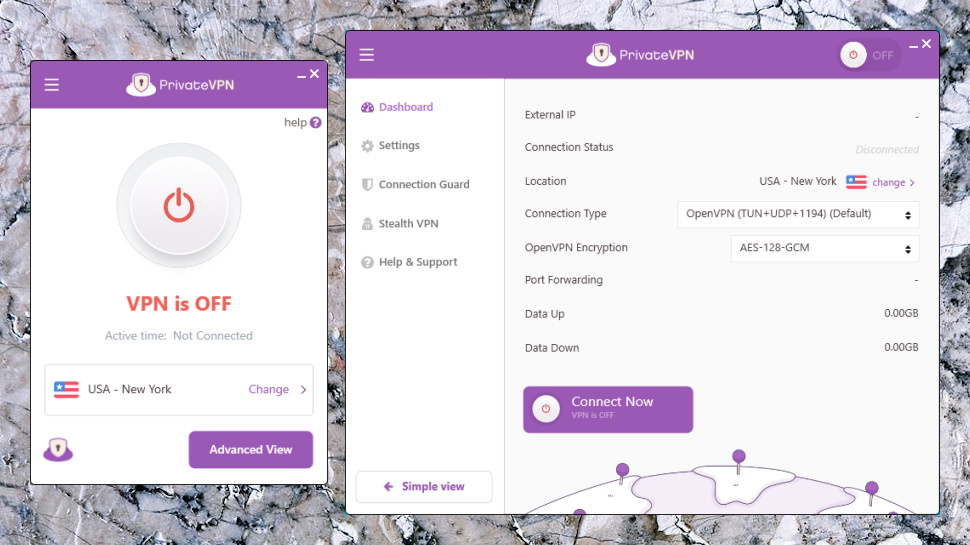
Windows app
PrivateVPN's Windows app opens with a very simple interface, covering the bare VPN essentials only. The current location is highlighted, and you can choose another from the list. A big On/Off button connects and disconnects as required, and there's a menu button with help and account links. It's all very straightforward, and anyone with previous VPN experience will feel at home right away.
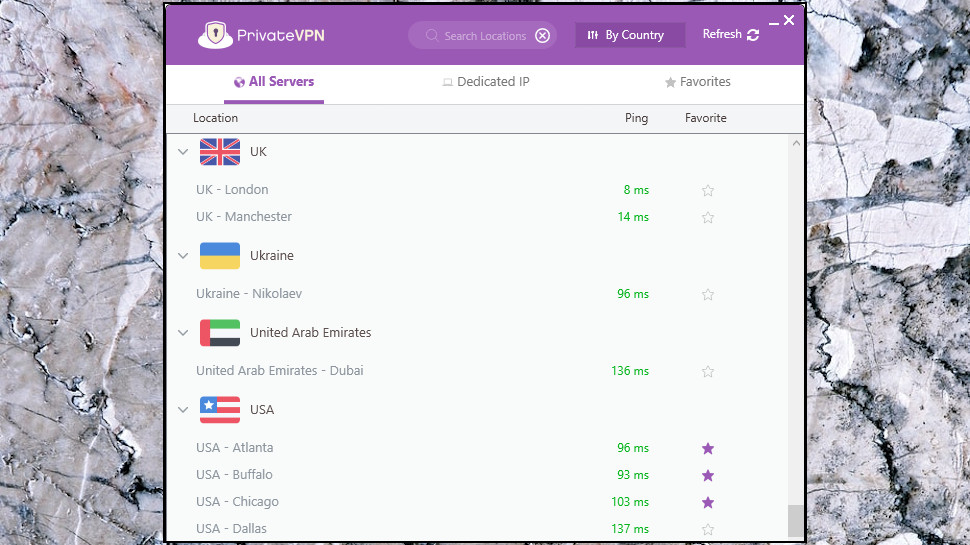
Explore a little further, though, and there's some worthwhile functionality here. The app doesn't just present locations as a plain text menu, for instance. These are listed in a separate window, with cities already visible (no need to expand country lists individually), and ping times to indicate their distance. You can sort these by name or distance, use a Search box to find a specific server, or save your most commonly-used locations as Favorites. And there's a separate panel for dedicated IP locations.
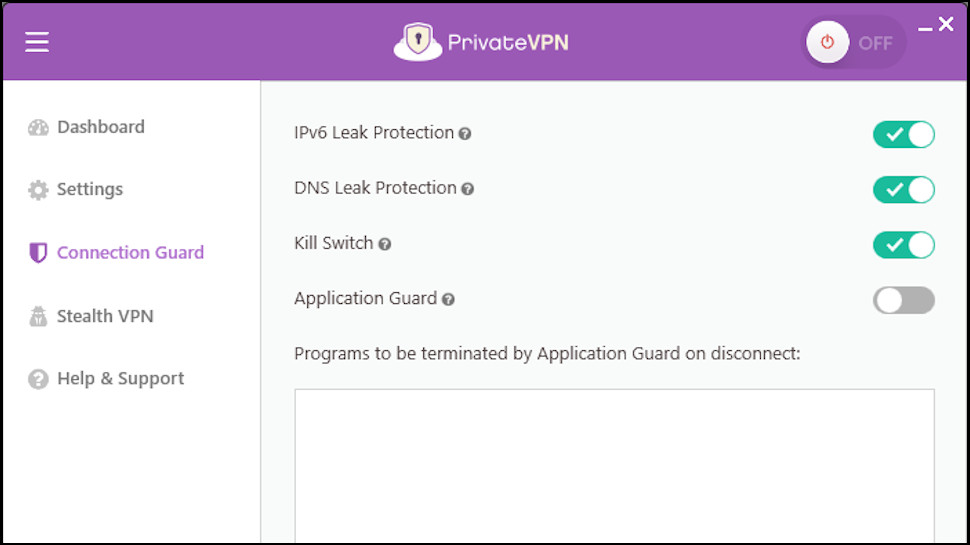
That's just the start. The app opens with a simple, stripped-back console, but click the Advanced View button and it expands to give you many more functions and features.
You're able to choose the protocol (OpenVPN TUN, TAP, TCP and UDP, L2TP, PPTP) and OpenVPN encryption method (AES-128/256-CBC/GCM) direct from the console. That's not the ideal list – we'd like WireGuard support in the app, and PPTP is so insecure it's been dropped by most VPNs – but it does give you more OpenVPN control than some providers.
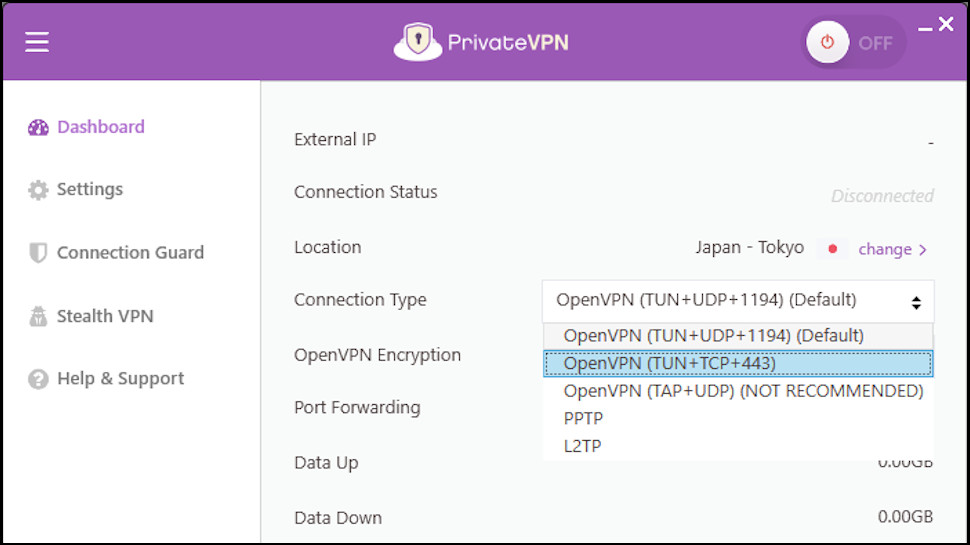
A Connection Guard feature combines several technologies to protect your privacy: IPv6 and DNS leak protection, and both a system-wide and application-level kill switch to protect you if the VPN drops. (You could set up the system to automatically kill your P2P client if the tunnel fails, for instance.)
A Stealth VPN feature aims to help you bypass firewalls and get online, even in VPN-unfriendly countries.
The app can install or repair its Windows TAP adapter, often a useful way to solve connection problems. And if that doesn't work, you're able to browse the app log files, or click a link to open a live chat session on the PrivateVPN site.
It's a capable feature set, but there are features you might miss. There's no split tunneling, for instance, no multi-hop VPN, and no 'auto-connect when accessing untrusted networks', something we often see with lesser apps.
There's still enough functionality here to make for a cluttered interface in places, and users won't necessarily understand all the technical terms. But the app's dual interface approach means this isn't a major issue. If you only need the VPN basics, stick with the Simple View and you don't ever have to worry about the low-level complexities. But if you need more, the advanced features are only a click away.
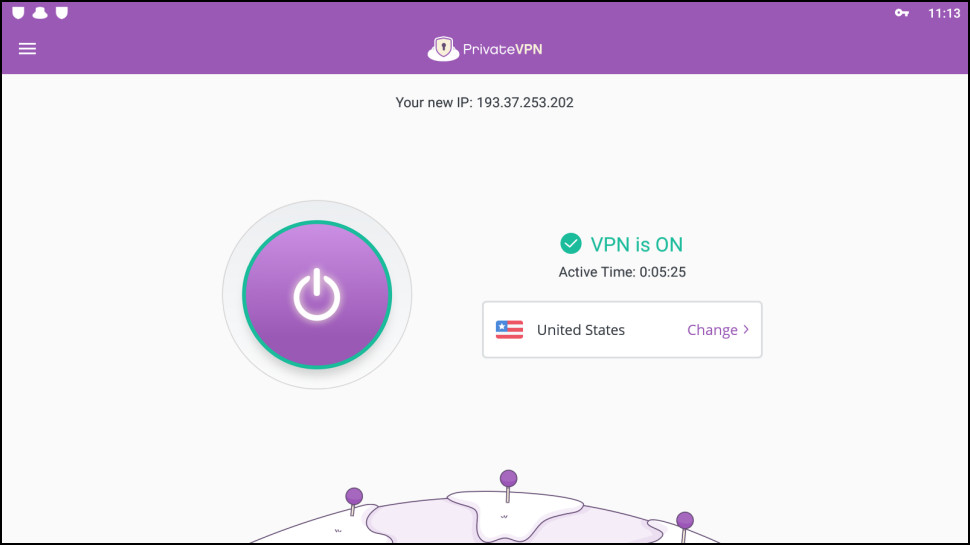
Mac and mobile apps
PrivateVPN's Mac app looks much the same as the Windows version, with a simple opening window, a capable location list with Favorites, and an Advanced View for experienced users.
Look closely and you'll notice a few differences. The location list doesn't display ping times for each server, for instance, and the Mac app is missing a couple of Windows options (there's no configurable DNS leak protection, and no application-level kill switch).
This is still a likeable app, user-friendly and boasting some worthwhile features in its kill switch and IPv6 leak protection. But it doesn't quite have the power to compete with the best of the Mac competition.
PrivateVPN's mobile apps drop the desktop's Simple and Advanced Views in favor of a single, simple interface. It works well, and looks and feels much like the rest of the range, although there are a few more differences in features.
The Android app is the most powerful of the two, with a kill switch, OpenVPN support, IPv6 leak protection and Stealth VPN features. If there's a downside, it's that there's no support for any other protocols.
PrivateVPN's iOS offering gives you protocol options (OpenVPN, IKEv2, IPSec), and supports Stealth VPN, but drops the kill switch and IPv6 leak protection.
Overall, this is a decent range of apps which look good and more than deliver on the VPN basics. But as with the Windows app, PrivateVPN has missed out WireGuard support, split tunneling, 'auto-connect when accessing untrusted networks', and some of the more advanced features we often see elsewhere.
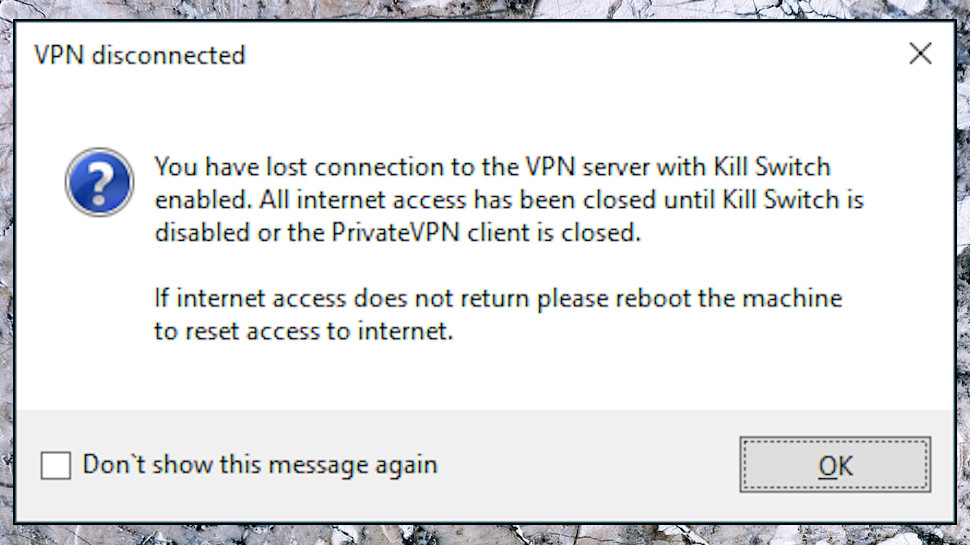
App testing
PrivateVPN's Windows app performed its main tasks well. Connection times were typically 4 to 8 seconds, very reasonable for an OpenVPN app. Desktop and audio notifications alert you as to when you're protected and when you're not. The app interface generally worked as we expected, and we didn't run into any problems.
The kill switch did a great job during testing. We use various ways to close the VPN connection, including simulating a software crash, but the app shrugged off all our efforts, blocked our internet, and began reconnecting immediately.
Many VPN apps enable their kill switch without telling the user, which means the internet goes down for no obvious reason. PrivateVPN handles the situation far better, displaying an informative alert to explain that the VPN has dropped, internet access is blocked by the kill switch, and that the user should close the app, disable the kill switch or reboot the device to get it back. In short, exactly what you need to know.
Our leak test results weren't as impressive. Running multiple tests from several sites showed no sign of DNS or other leaks when connecting via OpenVPN, the default app protocol. But dnsleaktest.com, dnsleak.com, ExpressVPN's DNS Leak Test page and others showed a DNS leak when connecting via L2TP or PPTP. If you only ever use OpenVPN, this shouldn't be an issue. But if you need to connect via L2TP, it's a concern.
If you have problems with any aspect of the service, PrivateVPN's 24/7 live chat is on hand to help. When we tried a test question, despite being listed as 1/1 in the queue, it took around 4 minutes for an agent to respond. But after that, the agent performed very well, asking only the most necessary questions, then immediately providing an accurate and detailed answer, and inviting us to return if we needed more help.
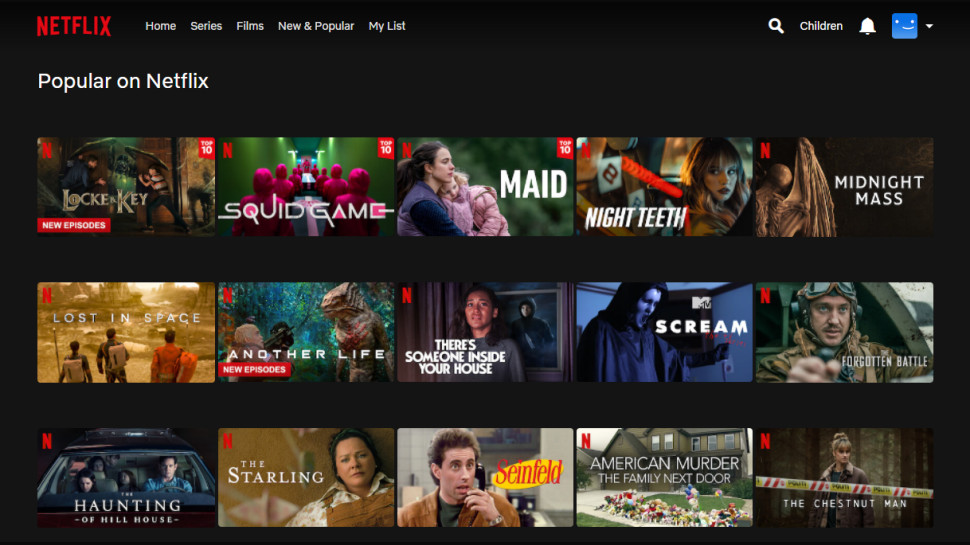
Netflix and streaming
The PrivateVPN website claims to be 'the most trusted VPN for Netflix', which allows you to 'unlock your favorite Netflix shows anywhere in the world.'
That's one very big boast, but it turned out to be true. Not only did PrivateVPN get us into US Netflix without any difficulty, but it worked with libraries in the UK, Australia, Canada and Japan, too.
(There was one small complication: unblocking Netflix worked perfectly when we chose servers from the Dedicated IP location list, but not at all when we used the regular 'All Servers' list. The app doesn't make that clear, so it's worth keeping in mind if you try the service for yourself.)
Unblocking BBC iPlayer was just as straightforward, and PrivateVPN gave us access to the site right away.
It was the same story with Amazon Prime Video and Disney Plus – PrivateVPN breezed past their defenses and allowed us to view whatever we liked.
That's full marks for unblocking; an excellent performance which puts PrivateVPN right up there with ExpressVPN, NordVPN, CyberGhost and Surfshark as a top Netflix VPN.
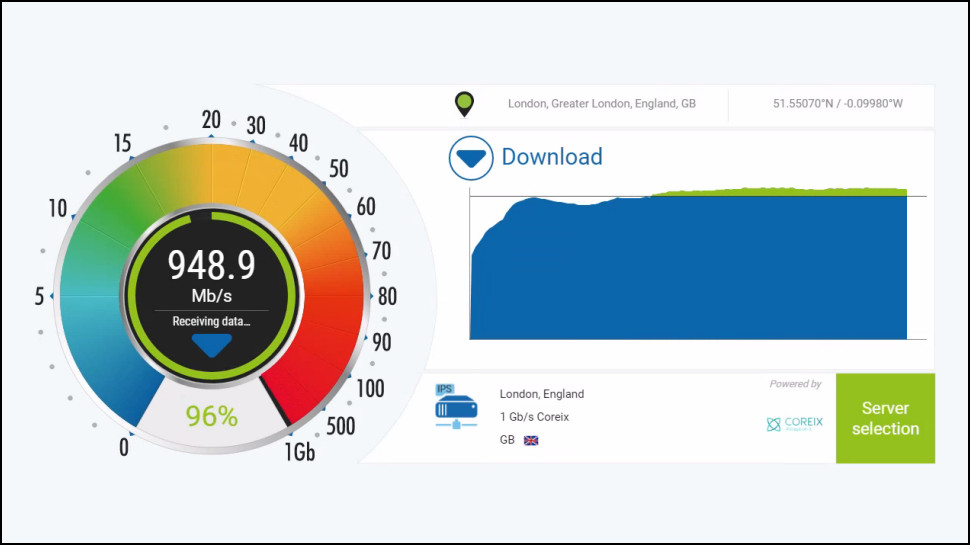
Performance
We test VPN performance using SpeedTest's command line app, website and other benchmarking services, from both US and UK test locations. Each test environment has a 1Gbps connection, giving us plenty of room to see exactly what a provider can do.
PrivateVPN's OpenVPN speeds were a mid-range 200-340Mbps in the UK, and an excellent 390-410Mbps in the US. That outperformed most of the competition, although Hide.me (440-450Mbps) and Mullvad (480-490Mbps) edged a little ahead.
PrivateVPN's apps don't support WireGuard (though you can set them up manually), but switching to L2TP got us a touch more speed, and we peaked at 490Mbps.
That's likely to be fast enough for many users, but it trails far behind the best of the competition. CyberGhost, Hide.me, IPVanish, Mozilla VPN and TorGuard all reached 850Mbps or more in recent tests.
PrivateVPN review: Final verdict
PrivateVPN's top-notch website unblocking and great value deals could make it a smart choice for a Netflix VPN. But the lack of app support for WireGuard, the shortage of advanced features (no split tunneling here) and some technical issues are likely to put off more demanding users.
- We've also highlighted the best VPN
0 comments:
Post a Comment